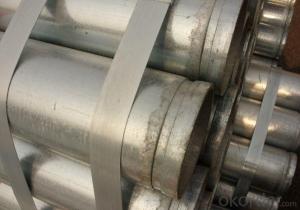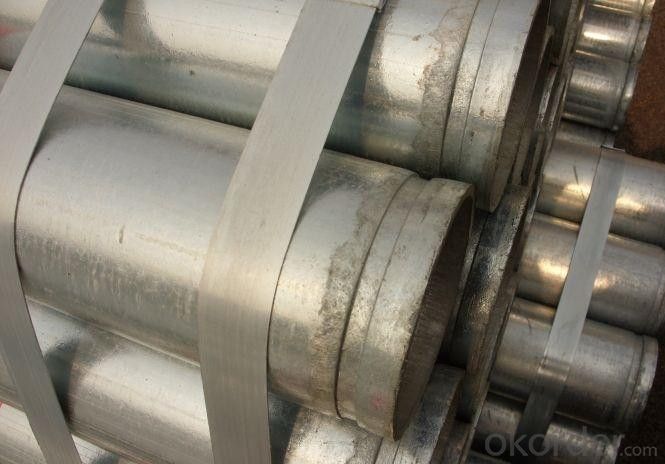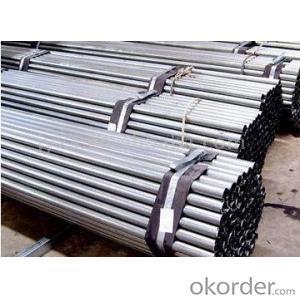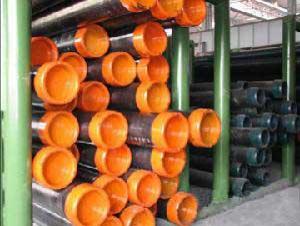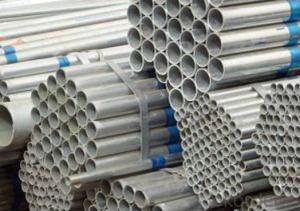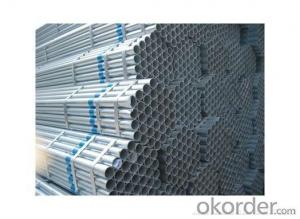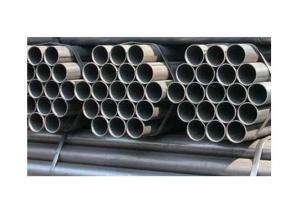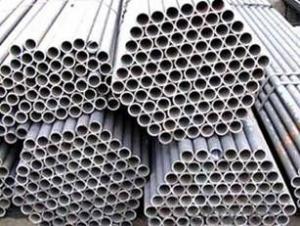galvanized seamless grooved pipe
- Loading Port:
- China Main Port
- Payment Terms:
- TT OR LC
- Min Order Qty:
- -
- Supply Capability:
- -
OKorder Service Pledge
OKorder Financial Service
You Might Also Like
Our company is specialized in the supply of Hot Dipped Galvanized Pipes. We supply stee pipesl with very competitive price to meet customers' needs with the satisfied service and high standard quality.
Name | galvanized pipe with the standard quality |
Material | Q195, Q215, Q235, Q345, STK500 |
Specification | O.D.: 20- 273.1MM W.T.: 0.8 - 5mm |
Length | 5.8m, 6m, 11.8m or 12m, or per the buyers demand |
Surface treatment | Oil-dip, Varnish, Passivation, Phosphating, Shot Blasting. |
Certificates | BS1387-1985, DIN2440/2441, JIS-G3444 and ASTM |
Manufacture Technique | Seamless |
Section Shape | Round |
End | A): GTC (galvanized threaded and coupling) |
Weight | Billing on the basis of theoretical weight |
Packaging Details | Export packing or negotiation |
Trade Terms | FOB/CFR/CIF |
Payment Terms | L/C T/T |
Usage | Petroleum casing pipe/etroleum cracking pipe/gas cylinder tubes/highpressure boiler tubes/ high pressure chemical fertilizer pipe, ship tube |
Delivery Time | 7-30 days OR upon the negotation |
Minimum Order Quantity | 20/50/100 MT |
Supply Ability | 1000 Ton/Month |
Inspection | Chemical Composition Inspection, Mechanical Properties Test(Tensile Strength,Yield Strength, Elongation, Flaring, Flattening, Bending, Hardness, Impact Test), Surface and Dimension Test,No-destructive Test, Hydrostatic Test. |
- Q: Are steel pipes suitable for industrial cooling systems?
- Yes, steel pipes are suitable for industrial cooling systems. They are highly durable, resistant to corrosion, and can withstand high pressures and temperatures. Additionally, steel pipes have excellent heat transfer properties, making them efficient for cooling applications.
- Q: How are steel pipes recycled at the end of their life cycle?
- Steel pipes are typically recycled at the end of their life cycle through a process called steel recycling. This involves collecting the used pipes, separating them from other materials, and then melting them down to be formed into new steel products. The recycling process not only helps conserve valuable resources but also reduces the need for new steel production, making it an environmentally sustainable solution.
- Q: What is DN50 for welded pipe?
- Refers to the use of welded steel pipe made of DN50 steel pipe, refers to the inside diameter is 50mm, the market of common DN50 pipe also refers to the 2 inch pipe, standard pipe: 3.5mm thickness, pipe diameter 60mm, the weight of 4.88kg/m theory.
- Q: What are the different types of steel pipe fittings?
- Some of the different types of steel pipe fittings include elbow fittings, tee fittings, cross fittings, coupling fittings, nipple fittings, and cap fittings.
- Q: What are the factors that affect the lifespan of steel pipes in different environments?
- The factors that affect the lifespan of steel pipes in different environments include the presence of corrosive substances, such as chemicals or saltwater, which can corrode the steel and lead to degradation over time. Other factors include temperature fluctuations, which can cause expansion and contraction of the steel, leading to stress and potential cracking. The quality of the protective coating on the pipes also plays a role, as a strong and durable coating can provide better resistance against corrosion and prolong the lifespan of the pipes. Additionally, the maintenance and regular inspection of the pipes, including cleaning and repairs, can help identify and address any issues early on, preventing further damage and extending their lifespan.
- Q: What is the difference between steel pipe and copper pipe?
- The main difference between steel pipe and copper pipe lies in their material composition. Steel pipe is made of steel, while copper pipe is made of copper. Steel pipe is stronger and more durable, making it suitable for high-pressure and heavy-duty applications. On the other hand, copper pipe is more malleable and corrosion-resistant, making it ideal for plumbing and water supply systems. Additionally, copper pipe is more expensive than steel pipe but offers better heat conductivity, making it suitable for heating and cooling applications.
- Q: How do you calculate the buoyancy of submerged steel pipes?
- To calculate the buoyancy of submerged steel pipes, you need to consider the principle of Archimedes' buoyancy. This principle states that the buoyant force acting on an object submerged in a fluid is equal to the weight of the fluid displaced by the object. To calculate the buoyant force, you need to determine the volume of the fluid displaced by the submerged steel pipe. The volume can be calculated by multiplying the cross-sectional area of the pipe by the length of the submerged portion. Next, you need to determine the density of the fluid in which the steel pipe is submerged. This can be obtained from the fluid's properties or by referring to known values. Once you have the volume and density of the fluid, you can determine the weight of the fluid displaced by the submerged pipe using the equation: weight = volume × density × acceleration due to gravity. Finally, the buoyant force can be calculated by multiplying the weight of the displaced fluid by the acceleration due to gravity. This will give you the upward force exerted on the submerged steel pipe by the fluid. It is important to note that in order to accurately calculate the buoyancy of submerged steel pipes, you should also consider any additional factors such as the weight of the pipe itself, any attached equipment or coatings, and the specific conditions of the fluid in which it is submerged.
- Q: How are steel pipes used in the construction of water supply systems?
- Steel pipes are commonly used in the construction of water supply systems due to their durability and strength. They are often used to transport water from the source to treatment plants, as well as for distribution to homes and businesses. Steel pipes are resistant to corrosion, which ensures the quality of the water and the longevity of the system. Additionally, their high pressure-bearing capacity makes them suitable for water supply networks that require efficient and reliable transportation of water.
- Q: What is the buckling type thin-wall steel pipe? What is a tight set of thin-walled steel tubes? What's the difference between the two?
- The nut body and the junction box are connected at one end by adopting metric fine tooth thread, and the pipe is connected with the pipe, and one end is the same as the straight pipe joint (direct). Withhold the box joint points inside and outside teeth two. The diameter of straight pipe joint is divided into 16mm, 20mm, 25mm, 32mm, 40mm, 50mm.
- Q: Do steel pipes expand or contract with temperature changes?
- Steel pipes expand when subjected to an increase in temperature and contract when exposed to a decrease in temperature. This phenomenon is a result of the thermal expansion and contraction properties of steel, which is a characteristic of most materials. When steel pipes are heated, the molecules within the metal gain energy and vibrate more vigorously, causing them to move apart and expand in size. Conversely, when the temperature of the steel pipes decreases, the molecules lose energy and move closer together, resulting in a contraction or shrinkage in size. It is important to consider these thermal expansion and contraction properties of steel pipes when designing and installing them, as failure to account for these changes may lead to structural damage, leaks, or other issues.
Send your message to us
galvanized seamless grooved pipe
- Loading Port:
- China Main Port
- Payment Terms:
- TT OR LC
- Min Order Qty:
- -
- Supply Capability:
- -
OKorder Service Pledge
OKorder Financial Service
Similar products
Hot products
Hot Searches
Related keywords
